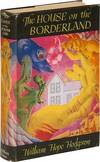

The Papers of Sir William Johnson, Volume X1
by Johnson, Sir William, and Hamilton, Milton W. (Preparer)
- Used
- good
- Hardcover
- first
- Condition
- Good
- Seller
-
Silver Spring, Maryland, United States
Payment Methods Accepted
About This Item
Albany, New York: The University of the State of New York, 1953. Presumed First Edition, First printing. Hardcover. Good. viii, 994, [2] pages. Frontis illustration. Ex-library with usual library markings. Minor edge soiling. Includes Footnotes, Fold-out map at p. 958. Preface, The Indian Uprising, 1764-1765. Includes 13 black and white illustrations. The years 1764 to 1765 covered by the material of this book mark the interval between the Pontiac Uprising and the preliminary rumblings of the coming Revolution. Sir William Johnson, 1st Baronet (c. 1715 - 11 July 1774), was an Irish official of the British Empire. As a young man, Johnson moved to the Province of New York to manage an estate purchased by his uncle, Admiral Peter Warren, which was located amidst the Mohawk, one of the Six Nations of the Iroquois League. Johnson learned the Mohawk language and Iroquois customs, and was appointed the British agent to the Iroquois. Because of his success, he was appointed in 1756 as British Superintendent of Indian Affairs for the northern colonies. Throughout his career as a British official among the Iroquois, Johnson combined personal business with official diplomacy, acquiring tens of thousands of acres of Native land and becoming very wealthy. Johnson commanded Iroquois and militia forces during the French and Indian War, the North American theater of the Seven Years' War (1754-1763) in Europe. His role in the British victory at the Battle of Lake George in 1755 earned him a baronetcy; his capture of Fort Niagara in 1759 brought him additional renown. Serving as the British Superintendent of Indian Affairs for the northern district from 1756 until 1774, Johnson worked to keep Indians attached to the British. Dr. Hamilton was appointed senior historian in the New York State Education Department's Division of Archives and History in 1949, which he led as acting director from 1963 until he retired in 1965. Among the books he wrote was a biography, ''Sir William Johnson: Colonial American, 1715-1763,'' and ''The Country Printer,'' a study of printers, editors and publishers in New York State from 1785 to 1830. He was a graduate of Syracuse University, where he earned a master's degree in 1926. In 1936, he received a Ph.D. from Columbia University. He was a professor of history at Albright College in Reading, Pa.
Pontiac's War, also known as Pontiac's Conspiracy or Pontiac's Rebellion, was launched in 1763 by a loose confederation of American Indian tribes, primarily from the Great Lakes region, the Illinois Country, and Ohio Country who were dissatisfied with British policies in the Great Lakes region following the French and Indian War (1754-1763). Warriors from numerous tribes joined the uprising in an effort to drive British soldiers and settlers out of the region. The war is named after Ottawa leader Pontiac, the most prominent of many Indian leaders in the conflict. The war began in May 1763 when American Indians were offended by the policies of British General Jeffrey Amherst and attacked a number of British forts and settlements. Eight forts were destroyed and hundreds of colonists were killed or captured, with many more fleeing the region. Hostilities came to an end after British Army expeditions in 1764 led to peace negotiations over the next two years. The Indians were unable to drive away the British, but the uprising prompted the British government to modify the policies that had provoked the conflict. On August 1, 1763, most of the Indians broke off the siege at Fort Pitt in order to intercept 500 British troops marching to the fort under Colonel Bouquet. On August 5, these two forces met at the Battle of Bushy Run. Bouquet's force suffered heavy casualties, but they fought off the attack and relieved Fort Pitt on August 20, bringing the siege to an end. His victory at Bushy Run was celebrated in the British colonies; church bells rang through the night in Philadelphia, and King George praised him. This victory was soon followed by a costly defeat. Fort Niagara was one of the most important western forts, but at least 300 Senecas, Ottawas, and Ojibwas attacked a supply train along the Niagara Falls portage on September 14, 1763. Two companies were sent from Fort Niagara to rescue the supply train, but the Indians defeated them. 102 soldiers and teamsters were killed and 9 wounded in these actions, which colonists dubbed the "Devil's Hole Massacre", the deadliest engagement for British soldiers during the war. From July to August 1764, Johnson negotiated a treaty at Fort Niagara with about 2,000 Indians in attendance, primarily Iroquois. Most Iroquois had stayed out of the war, but Senecas from the Genesee River valley had taken up arms against the British, and Johnson worked to bring them back into the Covenant Chain alliance. As restitution for the Devil's Hole ambush, the Senecas were compelled to cede the strategically important Niagara portage to the British. Johnson even convinced the Iroquois to send a war party against the Ohio Indians. This Iroquois expedition captured a number of Delawares and destroyed abandoned Delaware and Shawnee towns in the Susquehanna Valley, but otherwise the Iroquois did not contribute to the war effort as much as Johnson had desired.
Pontiac's War, also known as Pontiac's Conspiracy or Pontiac's Rebellion, was launched in 1763 by a loose confederation of American Indian tribes, primarily from the Great Lakes region, the Illinois Country, and Ohio Country who were dissatisfied with British policies in the Great Lakes region following the French and Indian War (1754-1763). Warriors from numerous tribes joined the uprising in an effort to drive British soldiers and settlers out of the region. The war is named after Ottawa leader Pontiac, the most prominent of many Indian leaders in the conflict. The war began in May 1763 when American Indians were offended by the policies of British General Jeffrey Amherst and attacked a number of British forts and settlements. Eight forts were destroyed and hundreds of colonists were killed or captured, with many more fleeing the region. Hostilities came to an end after British Army expeditions in 1764 led to peace negotiations over the next two years. The Indians were unable to drive away the British, but the uprising prompted the British government to modify the policies that had provoked the conflict. On August 1, 1763, most of the Indians broke off the siege at Fort Pitt in order to intercept 500 British troops marching to the fort under Colonel Bouquet. On August 5, these two forces met at the Battle of Bushy Run. Bouquet's force suffered heavy casualties, but they fought off the attack and relieved Fort Pitt on August 20, bringing the siege to an end. His victory at Bushy Run was celebrated in the British colonies; church bells rang through the night in Philadelphia, and King George praised him. This victory was soon followed by a costly defeat. Fort Niagara was one of the most important western forts, but at least 300 Senecas, Ottawas, and Ojibwas attacked a supply train along the Niagara Falls portage on September 14, 1763. Two companies were sent from Fort Niagara to rescue the supply train, but the Indians defeated them. 102 soldiers and teamsters were killed and 9 wounded in these actions, which colonists dubbed the "Devil's Hole Massacre", the deadliest engagement for British soldiers during the war. From July to August 1764, Johnson negotiated a treaty at Fort Niagara with about 2,000 Indians in attendance, primarily Iroquois. Most Iroquois had stayed out of the war, but Senecas from the Genesee River valley had taken up arms against the British, and Johnson worked to bring them back into the Covenant Chain alliance. As restitution for the Devil's Hole ambush, the Senecas were compelled to cede the strategically important Niagara portage to the British. Johnson even convinced the Iroquois to send a war party against the Ohio Indians. This Iroquois expedition captured a number of Delawares and destroyed abandoned Delaware and Shawnee towns in the Susquehanna Valley, but otherwise the Iroquois did not contribute to the war effort as much as Johnson had desired.
Reviews
(Log in or Create an Account first!)
Details
- Seller
- Ground Zero Books
(US)
- Seller's Inventory #
- 80468
- Title
- The Papers of Sir William Johnson, Volume X1
- Author
- Johnson, Sir William, and Hamilton, Milton W. (Preparer)
- Format/Binding
- Hardcover
- Book Condition
- Used - Good
- Quantity Available
- 1
- Edition
- Presumed First Edition, First printing
- Publisher
- The University of the State of New York
- Place of Publication
- Albany, New York
- Date Published
- 1953
- Keywords
- Sir William Johnson, Pontiac Uprising, Henry Bouquet, James Murray, Fort Herkimer, Thomas Gage, Fort Niagara, Fort Pitt, Alexander McKee, Cadwallader Colden, Louis Perthuis
Terms of Sale
Ground Zero Books
Books are offered subject to prior sale. Satisfaction guaranteed. If you notify us within 7 days that you are not satisfied with your purchase, we will refund your purchase price when you return the item in the condition in which it was sold.
About the Seller
Ground Zero Books
Biblio member since 2005
Silver Spring, Maryland
About Ground Zero Books
Founded and operated by trained historians, Ground Zero Books, Ltd., has for over 30 years served scholars, collectors, universities, and all who are interested in military and political history.
Much of our diverse stock is not yet listed on line. If you can't locate the book or other item that you want, please contact us. We may well have it in stock. We welcome your want lists, and encourage you to send them to us.
Much of our diverse stock is not yet listed on line. If you can't locate the book or other item that you want, please contact us. We may well have it in stock. We welcome your want lists, and encourage you to send them to us.
Glossary
Some terminology that may be used in this description includes:
- First Edition
- In book collecting, the first edition is the earliest published form of a book. A book may have more than one first edition in...
- New
- A new book is a book previously not circulated to a buyer. Although a new book is typically free of any faults or defects, "new"...

